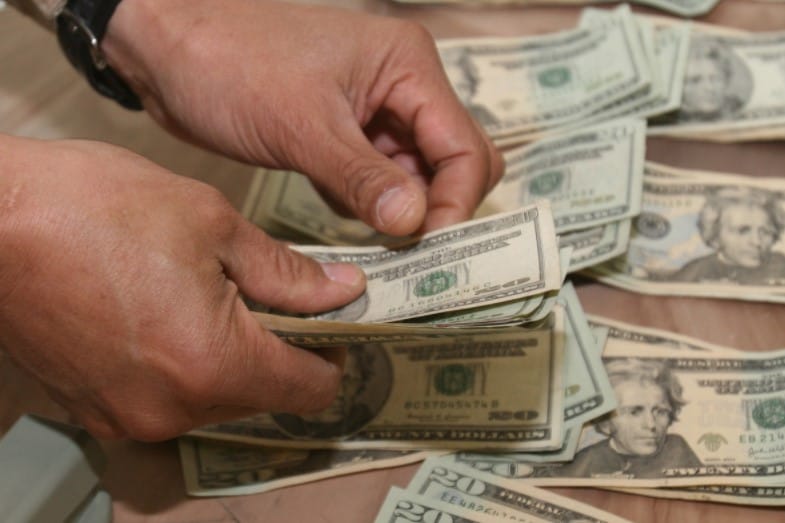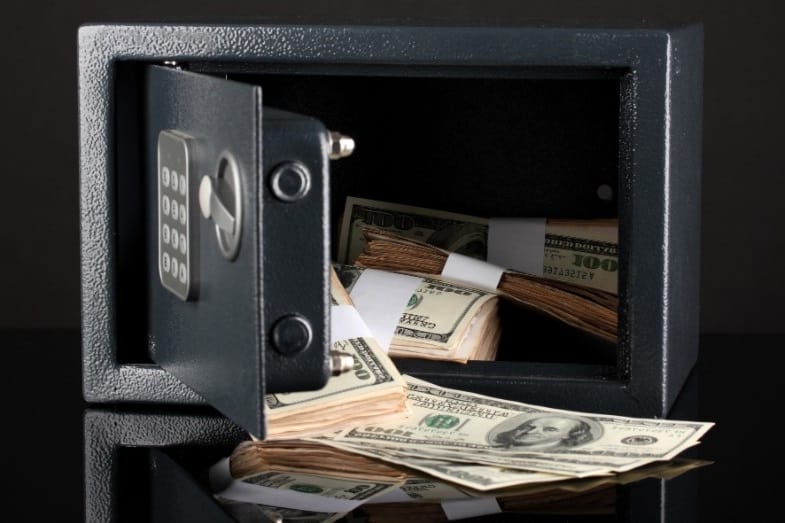How much cash can you keep at home legally? I’ve seen this question popping up in different forums, and so I thought I would answer it here. In this article, I’ll describe how much cash you can keep at home legally – in the US – and how to securely store your money.
How much cash can you legally keep at home? You can legally keep as much cash as you want at home, but you have to declare the cash source in your income tax returns. Also, you can legally keep as much silver, gold, and other material wealth in your home as you would like.
If you plan to keep a lot of cash at home, it is important to learn how to secure your cash so that it is kept safe.
Read on to learn more about keeping your cash at home, as well as how to keep it protected.
How Much Cash Can You Keep at Home Legally?
Keeping your cash at home can be advantageous in uncertain times or on a rainy day. It’s also a good idea to have silver and gold as their value is more stable than cash.
In the US, you can keep all the amount of cash you want, including silver and gold, but make sure that you have declared these valuables in your income tax returns.
Nevertheless, the idea of having them stolen or losing them due to natural calamities could be devastating. So, it would help if you learned how to store your valuables securely.
Additionally, cops can seize your stash of cash if law enforcers suspect you of committing any crime. So, make sure you have declared the cash in your tax returns.
In the UK, you can also keep any amount of cash in your home. However, you should be able to declare the source of the money and prove that it was acquired legally.
Benefits of Keeping Cash at Home
There are various advantages of keeping your cash close to you.
1. Anytime You Need a Large Amount of Cash, You Won’t Have Trouble Coming up with It
Banks have maximum withdrawals per day, and you can only withdraw as much as the bank allows you to. The maximum daily withdrawal from an ATM is usually USD$500 to USD$2,500.
You may be permitted to withdraw all the money from your bank, but the bank has to report to the IRS if you have withdrawn more than USD$10,000 cash. The IRS may visit you to know where you need the money.
However, there are exceptions to this rule. These exceptions are as follows:
- If the bank identifies you as a regular business customer
- You belong to a government agency
- You’re from another bank
2. You’re Confident You Can’t Go Bankrupt
There were instances when governments closed banks due to bankruptcy. Of course, banks have some of your money insured but only up to a certain amount. In the states, the standard insurance amount is USD$250,000 per depositor for each insured bank. Hence, if you want to deposit your money, you may want to distribute it based on each bank’s insurance amount.
Banks may close because of natural disasters, such as a tornado, earthquake, or war. With your money stashed within your reach, you can readily get hold of all the cash you need. A worsening economy could also cause a bank to close down. You can never tell when these disasters will happen.
3. You Can Quickly Obtain Cash
Whether you need money for small or big purchases, cash is quickly accessible. You don’t have to spend some time and energy going out to the bank or ATM.
In times of natural disasters, you can have cash in hand immediately. You don’t have to worry about the endless queue at the ATM or the bank.
4. Your Money Is Safe During an Electronic Meltdown
All banks transact using electronic data, both online and offline. When an electronic meltdown occurs, your money would be safely stashed in your house and not lost amidst the destruction of electronic files.
5. You Save Time and Energy
There’s no need to spend your energy and time going to the bank or the ATM when you need immediate cash. It’s a waste of time for extremely busy people, especially if you need just enough cash.

Why You Shouldn’t Keep a Lot of Cash at Home
There are also several reasons you should not keep a lot of cash at home and deposit your money in the bank instead.
1. Your Money Won’t Earn Interest
If it’s a considerable amount that could earn a monthly interest, then you’re throwing away money. The average interest is 0.09 percent for a regular savings account, while checking accounts have 0.06 percent.
If you have deposited the maximum amount of money (USD$250,000) into your regular savings account, you could earn 22,500 annually. That is if you don’t withdraw your money.
If you have your money on Time Deposit or Certificate of Deposit, it would even earn higher interest rates. But you won’t be able to withdraw anytime until the appropriate time. This time could be a month or a year, depending on the type that the bank offers.
2. Your Money Is Not Insured
If your money gets lost or stolen, you can no longer retrieve any amount from it. Unlike in the bank, where a certain amount is insured, you can at least count on that.
3. You Become a Target for Thieves
If the word comes out that you have stashed money in your home, you become a constant thief target. But, if you genuinely feel the need to keep your money at home, don’t advertise it and keep it in places that are secure and safe.
4. You Won’t Be Able to Pay Using Your ATM or Checking Account
It is customary to pay large purchases (cars or real estate) using your ATM or checking account. But if you don’t have a bank account, you will have to carry large amounts of cash with you. This situation can be dangerous and a magnet for thieves.
Thus, it would be good to place some money in the bank and some in your home. This way, whatever happens, you still have some money left. Also, some vendors don’t accept cash. So, you would be at a disadvantage.
5. It’s Almost Impossible to Buy Online with Cash
Nowadays, purchasing online is the primary means of buying things. If you have your cash stashed at home and you don’t have any bank account or ATM cards, you can’t buy online. You have to connect with a bank card before you can purchase online. So, it’s wise to put some money in the bank for this purpose.
We’ve answered the question, ‘How much cash can you keep at home legally?’; next, let’s look at where the best places in your home to keep your cash.
Where to Keep Your Cash at Home – What Are the Best Places?
Where should you keep your cash? You have a variety of places where you can keep your hard-earned money.
- Heavy-duty safes could be a safe place to keep your cash and valuables. They can be really expensive, but if you’re securing thousands of dollars, then a safe bolted to the wall or floor would be best.
- Remember to put some cash in your “go” bag. So, you can quickly retrieve it in emergency cases.
- Place some cash inside your garments separately, such as socks and pockets of folded clothing (sweaters, jackets, or pants) inside your drawers. Hanging clothes would easily be noticeable. Folded garments are not.
- Dig an unnoticeable hole in your yard and keep some of your money there. Make sure your container is airtight. Place your cash inside a zip-locked bag first before putting it inside a closed container.
- Use a diversion safe. These are things that look like something other than a safe, so thieves won’t suspect them to be a safe.
- Put cash in envelopes taped to the bottom of your drawers.
- Hide cash in an envelope taped under the glove compartment of your vehicle.
- Roll your money bundle with a rubber band, put it inside a zip-locked bag, and into a coffee bottle in your cupboard.
- Put some money inside a waterproof bag and taped at the back of your bathroom sink or bathtub.

For Large Amounts of Cash:
- If you have significant cash, use a waterproof and fire-resistant safe that you can securely bolt on the floor or wall, so robbers cannot carry it easily. Place it somewhere inconspicuous.
- Divide your cash into two or more safes. This way, when the first safe is discovered or damaged, you still have a backup safe to fall back on.
- The seller of your safes must have some sort of insurance equivalent to the amount of money you would keep there.
- The attic is not easily accessible to burglars, so you may want to keep one of your safes up there, hidden beneath one of the walls.
Tips on the Recommended Amount of Cash to Keep at Home
- A stash of cash that equals the amount you typically spend for six months would be ideal. If you need USD$3,000 to survive for a month, then you should keep USD$18,000 saved at home. This step is to prepare and be ready in case of emergencies where you could hit the road due to a natural or human-made disaster.
- If you’re single, you may want to keep a minimum amount of cash at home for emergencies. You can keep anywhere from USD$1,000 or more for a week’s expenses. Naturally, this would vary based on your lifestyle and spending practices.
- Some experts recommend the amount of cash you should keep at home is equivalent to your expenditures for six months.
Tips for Safely Keeping Your Cash and Valuables at Home
1. Keep It a Secret
Never tell anyone, except your spouse, that you’re keeping cash at home. You may want to inform your trusted adult children if you’re getting older. But don’t tell anyone about it. Your cash is safer when few people know about it.
2. Store It in a Place That No One Expects You To
Avoid keeping money in usual places that people use, such as mattresses, inside books, inside freezers, attics, or behind picture frames.
3. Don’t Keep All Your Cash in One Location
You can keep some amount in a safe bolted to a hidden wall or put some in a zip-locked bag and inside an airtight container to avoid moisture formation. Hide the container in a hole in your yard.
You can also put some cash in your bag, in case you have to leave quickly. Place some money inside clothing in your drawers, such as inside socks or folded sweaters. Prepare some envelopes with cash and tape them under unnoticeable tables and similar places. Be ingenious to secure your money.
4. Be Aware of Inflation
Take note of the status of the economy around you. You can lose the value of your cash unknowingly because of a bad economy. You can add more money at home accordingly.
5. Don’t Keep Cash Under Your Mattress or Pillow
These places are the most common locations thieves would look for. In one survey, researchers found out that the attic is one place thieves didn’t consider.
Conclusion – How Much Cash Can You Legally Keep at Home?
So, to recap, how much cash can you keep at home legally? You can legally keep all the cash you want at home, together with your silver, gold, and other material wealth. Nonetheless, you have to keep them safely and securely to prevent theft or suffer the danger of losing them.
You will have to make sure you declare your money in your tax returns, so you won’t be accused of stashing illegal money.
I recommend keeping your money both at home and in the bank so that you can enjoy the advantages of these two methods. After all, money doesn’t grow on trees.

![Read more about the article Does USPS Deliver on Sunday? [USPS Sunday Delivery]](https://howchimp.com/wp-content/uploads/2021/04/does-USPS-deliver-on-sunday-300x200.jpg)

![Read more about the article USPS Regional Facility – Arrived or Departed [What Does It Mean?]](https://howchimp.com/wp-content/uploads/2021/08/usps-regional-facility-300x200.jpg)